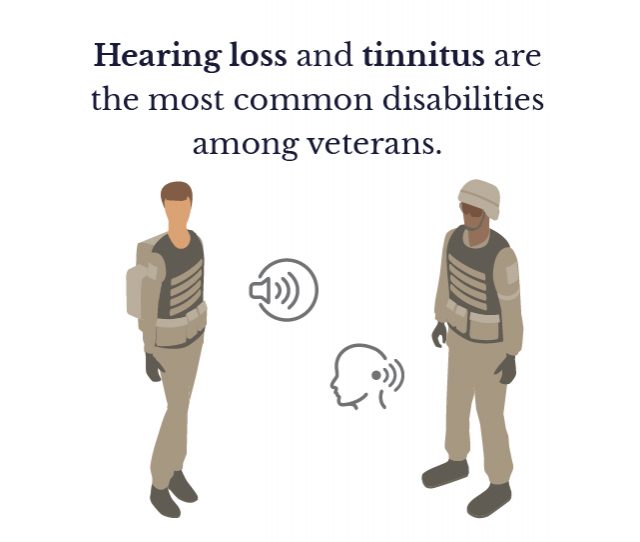 Hearing loss affects more than 38 million people in the United States, with more than half of those over 75 experiencing some degree of hearing loss. For American veterans, hearing problems and tinnitus are the most prevalent service-connected disability reported.1 Tinnitus is the number-one disability among Veterans and affects at least 1 in 10 American adults.2 People with tinnitus describe ringing sounds, a buzzing sound, a high-pitched whistle, or a variety of other sounds.
Hearing loss affects more than 38 million people in the United States, with more than half of those over 75 experiencing some degree of hearing loss. For American veterans, hearing problems and tinnitus are the most prevalent service-connected disability reported.1 Tinnitus is the number-one disability among Veterans and affects at least 1 in 10 American adults.2 People with tinnitus describe ringing sounds, a buzzing sound, a high-pitched whistle, or a variety of other sounds.
Currently there are over 3 million veterans receiving compensation for hearing loss or tinnitus. The most common causes for hearing loss in the military (excluding age-related hearing loss) is noise exposure from gunfire, tanks, and blasts. Many veterans with blast exposure may have normal hearing levels, but have difficulty understanding speech, especially in environments where there is background noise.
It is the policy of the Department of Veteran Affairs (VA), that veterans enrolled in the VA health system are eligible for medical services including diagnostic audiology and treatment including hearing aids and cochlear implants. These services are provided through the VA medical hospitals and clinics. VA medical clinics provide a full range of hearing services, from diagnostic testing and counseling to implantable devices and top-of-the-line hearing aids. According to the VA's 2014 directive for eye and ear care, the following veterans are most likely to receive hearing aid care are:
The above is not intended to be a complete list, so please consult with your VA benefits office for more information. To receive hearing aids or similar devices (such as a cochlear implant), you first must qualify for VA Health Benefits. Once enrolled, veterans can seek out benefits for hearing tests, examinations, and hearing aids. To begin this process, veterans should apply for enrollment online or by calling 1-877-222-VETS or visiting a local VA healthcare facility or regional office.
1-2 U.S. Department of Veteran Affairs (2021), Office of Research and Development: VA Research on Hearing Loss. https://www.research.va.gov/topics/hearing.cfm#:~:text=by%20Our%20Researchers-,Introduction,connected%20disability%20among%20American%20Veterans.